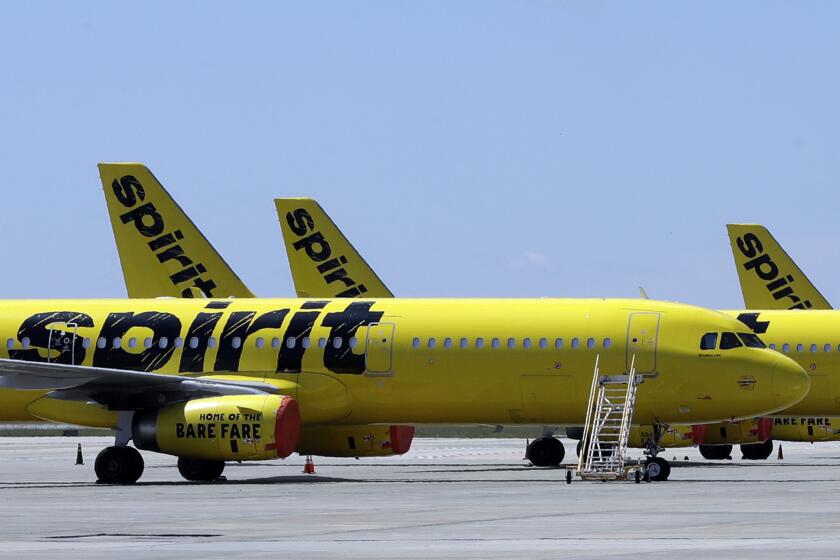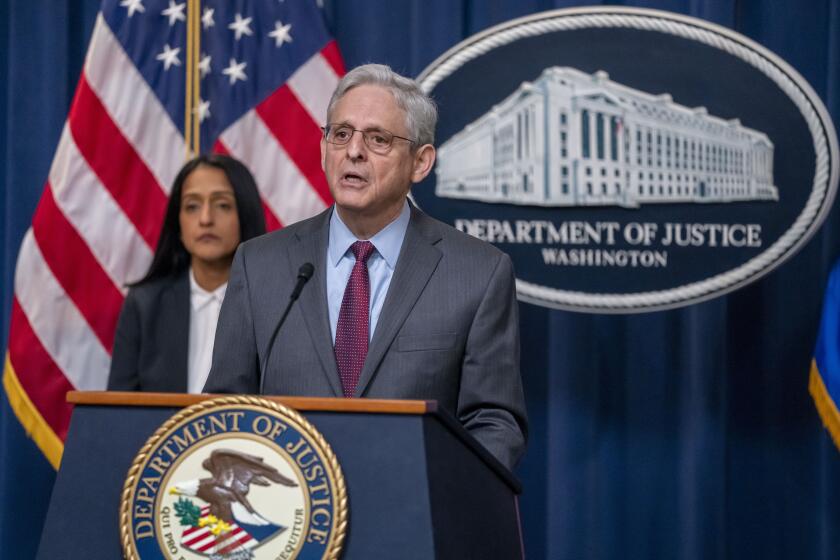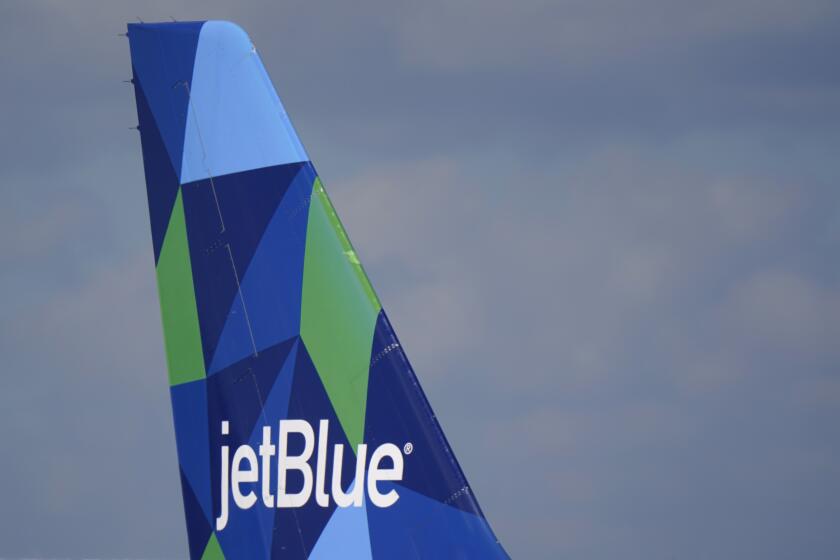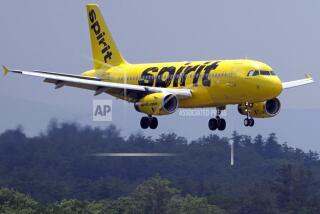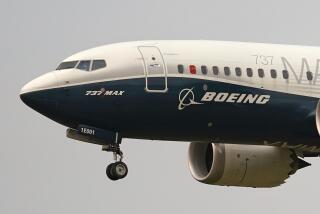Biden administration and JetBlue square off in court over Spirit deal
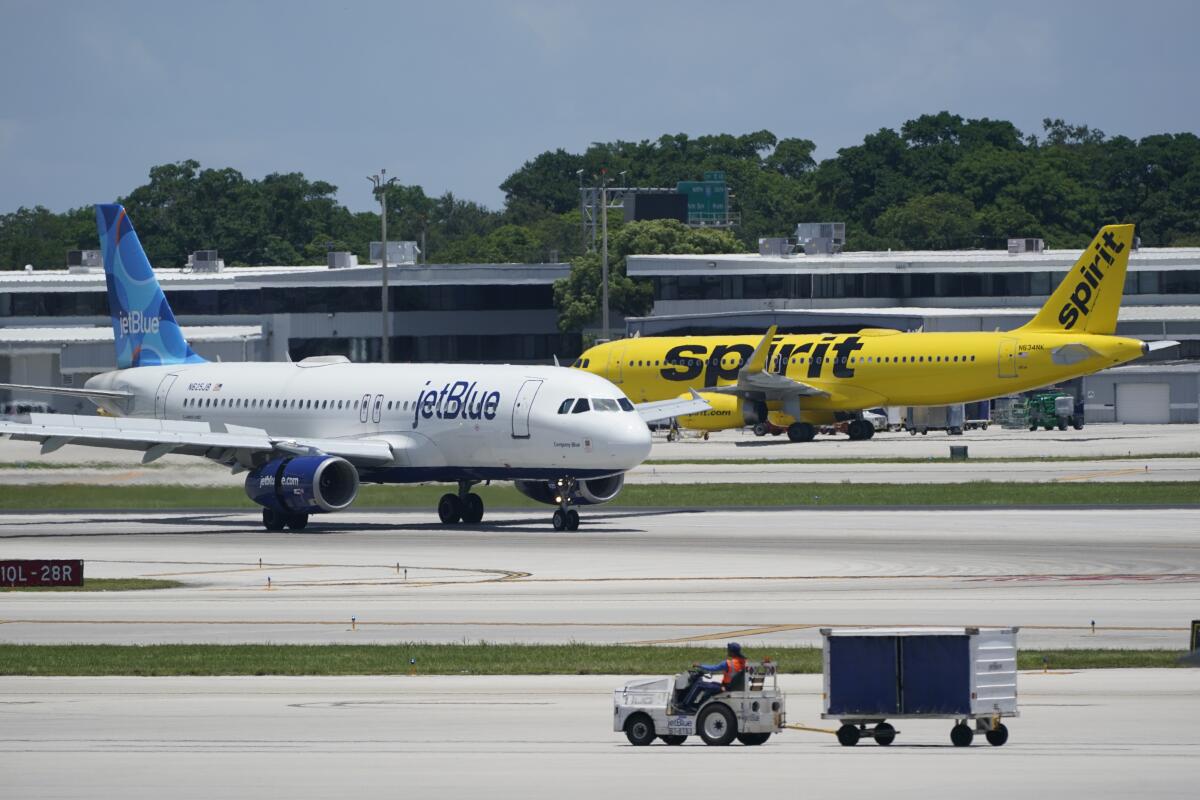
- Share via
A top Spirit Airlines executive said the company initially viewed a $3.8-billion takeover offer from JetBlue Airways as a bid to eliminate a low-cost rival, the same conclusion reached by U.S. regulators now trying to block the deal.
It appeared Spirit’s low-fare business model would be eliminated under JetBlue, Spirit Chief Executive Ted Christie told a federal judge Tuesday in Boston on the first day of trial testimony in the antitrust lawsuit brought by the U.S. Justice Department. “We were concerned this would be raised by regulators and wanted to point it out,” he said.
Spirit rejected JetBlue’s offer last year and urged its shareholders to approve a separate merger with another ultra-low-cost carrier, Frontier Group Holdings. But when investors failed to support the Frontier deal, Spirit began to reconsider a revised JetBlue offer, which included a $250-million breakup fee, Christie said.
The federal government, along with six states and Washington, D.C., sued last year to block the deal it says would kill JetBlue’s fastest-growing competitor in the U.S. and limit choices for passengers. But JetBlue lawyer Ryan Shores called the government’s objections “misguided” and told the judge that combining with Spirit was necessary for the two small carriers to better compete with larger rivals.
The case is the latest effort by the federal government to crack down on airline consolidation after decades of lax enforcement that left the nation’s four biggest airlines — American Airlines Group, Delta Air Lines, United Airlines Holdings and Southwest Airlines — with 80% of the market.
JetBlue has agreed to buy Spirit Airlines in a $3.8-billion deal, a day after Spirit and Frontier Airlines agreed to abandon their merger proposal.
In the early stages, Christie said there was concern among Spirit executives that merging with JetBlue would mean that the bulk of Spirit’s airplane capacity would no longer be operating as a low-cost carrier. Plus, they questioned whether the combined company would have as much of an effect as Spirit does in reducing fares on routes where it competes.
“We were skeptical,” Christie said.
The CEO also was asked by a government lawyer about Spirit describing the JetBlue offer in a May 2022 call with shareholders as having “lasting negative impacts on consumers.”
“These were our concerns about the regulatory conversation, as you can see,” said Christie, who will resume testimony in the case on Wednesday.
‘Real Harm’
The potential loss of an ultra-low-cost carrier was a key feature of the U.S. government’s opening statement Tuesday.
“JetBlue is counting on the fact that eliminating Spirit and the competition Spirit provides will allow JetBlue to increase fares,” Department of Justice attorney Arianna Markel said. “That is real harm to real people.” The deal is intended to make “a bigger, turbocharged JetBlue,” she said. “But bigger isn’t always better.”
Justice Department says the merger would hurt travelers who depend on Spirit to find cheaper options than they can find on JetBlue and other airlines.
JetBlue’s internal documents “will show that a bigger JetBlue means fewer planes, fewer seats and higher fares,” Markel said, adding that the company plans to reduce its capacity after the combination by removing 10% to 15% of available seats. “JetBlue itself projects that fares will increase 30% after Spirit exits.”
The government lawyer said Spirit is able to charge less than JetBlue because it has lower costs than its rival. The so-called “Spirit effect” on routes reflects the 20% average drop in fares from all carriers on routes where the company competes, Markel said.
It’s unlikely other ultra-low-cost carriers would step in to replace Spirit, which accounts for about half of that market, she said.
“The loss of Spirit would result in roughly a billion dollars of net harm, year after year, for millions of passengers who fly over 100 routes throughout the country,” she said. “Higher fares will mean that some people won’t be able to afford to fly at all.”
Investors have been skeptical that the deal will be completed, based on the wide gap between Spirit’s share price and JetBlue’s offer more than a year ago. Spirit’s fourth-quarter revenue forecast missed estimates last week and the stock fell 12.10% on Tuesday. It’s tumbled more than 40% this year.
‘Benefits Will Multiply’
In his opening statement, JetBlue lawyer Shores rejected claims that the deal would hurt competition and said the Justice Department lawsuit was the first time the government had ever challenged a merger of two small airlines on antitrust grounds.
JetBlue Airways is trying to buy Spirit Airlines and break up a plan for Spirit to merge with fellow budget airline Frontier.
“The stark division between industry haves and have nots is bad for competition and bad for consumers,” Shores said. “With this merger, JetBlue will finally become a disrupter nationwide, and the consumer benefits will multiply.”
JetBlue and Spirit are the sixth- and seventh-largest carriers in the U.S., and they need to combine to better compete with the bigger airlines and offer lower fares in more communities, he said. The companies account for just 8% of industry revenue.
“What the government did not tell you is that Spirit accounts for a small fraction of the overall competition on the routes that JetBlue flies,” at less than 4% of revenue on those routes, Shores said.
Legacy airlines Delta, American and United have more than 4,000 aircraft combined and are the real competitors for JetBlue — which has 294 planes, Shores said.
Small Market Share
Even after the merger, JetBlue’s market share would rise to just 7% from 5%, he said. But the deal would enable JetBlue to expand its presence in the western U.S. and have enough planes to get into legacy hubs “and meaningfully compete” with larger carriers, he said.
“The government repeatedly bemoaned that JetBlue has a higher average price than Spirit, but there is nothing wrong, much less anticompetitive, with JetBlue charging a price that is commensurate with its value,” Shores said. “For those customers who want the bare bones experience,” he said, “that option will be there.”
Jay Cohen, an attorney for Spirit, told the judge that the airline had plans to continue growing and competing as an independent company, but is now on track to lose money for the fourth straight year. Spirit executives have been pursuing a merger since 2016, discussing the possibility with both Frontier and Allegiant Travel, he said.
But no financial plan “will allow Spirit to get big enough on its own to compete more effectively for market share with the Big Four,” Cohen said.
JetBlue pledged to sell flight slots and gates at certain airports to ultra-low-cost carriers in order to resolve antitrust concerns, but the government contends the divestitures don’t go far enough to fully restore competition that would be lost if the deal is allowed to proceed.
The trial is being heard by U.S. District Judge William G. Young without a jury, which means he’ll be the one to decide whether the sale should be allowed.
More to Read
Inside the business of entertainment
The Wide Shot brings you news, analysis and insights on everything from streaming wars to production — and what it all means for the future.
You may occasionally receive promotional content from the Los Angeles Times.
